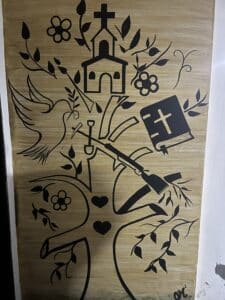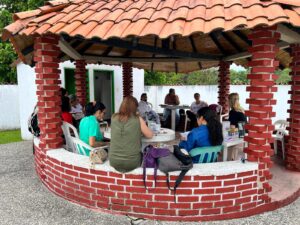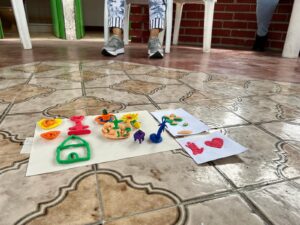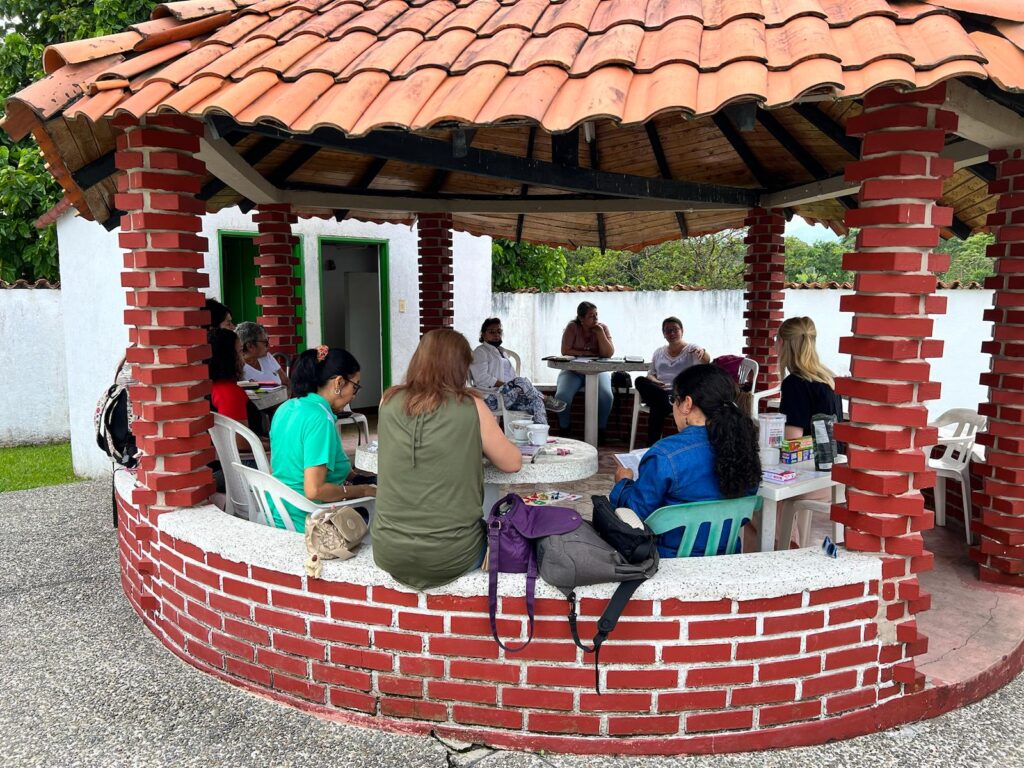Solecito
Written by: Alex Maldonado-Lizardi and Xiomara Cintron-Garcia who serve with the Christian Centre for Justice, Peace and Nonviolent Action (Justapaz), Bogota, Colombia
“I’m keen to break the war into a thousand pieces.” -Gioconda Belli

Martha Soley, better known as “Solecito”, was born on August 25, 1962 in Palestine, a village of the municipality of Salento, Quindío. She is the eldest of four sisters, from a purely farmer family, and she spent all her time on the family farm. But her father abandoned them when Martha was three years old. Then her mother married another man who took on the role of father for Martha and her sisters. Her biological father died seven years ago and her stepfather ten years ago.
She was 18 years old when she finished high school. It was 1980 and she had left Salento looking for new life horizons in Bogotá. There she got married and had three sons and a daughter. However, her husband abandoned her for another woman and 15 years later. Martha returned to Quindío, aged 33, with all the broken dreams of a violent marriage, and four children to raise. On top of everything, just returning to the well-known coffee region, her foster brother was murdered because of a revenge.
It is difficult for a woman to restart her life like this. Always facing the imprudence of incriminating questions about the home economy: “And how are you going to support those children? Who supports you?” That same year she tried to go to college, but she couldn’t continue: “I had to raise my children alone, so I had to work to be able to support them.”

Who can still sustain that violence does not affect women in a very particular way; women who are left alone and cry in unique ways; women who on more than one occasion work for different reasons and towards goals that they did not choose; women who care for everyone when no one cares for them, and for whom their political strength comes from the daily grind and not from the usual abstraction?
In fact, just a few years ago, Martha had to switch her phone number. She was helping in a political campaign in Circasia when she received a call that sentenced her: “Political lefties die with their mouths full of flies.”
What do we do with the fear, with the danger of being a woman and having a voice?
According to Justapaz’s human rights report, A Prophetic Call #16, and the monitoring exercise of the OSEAS observatory, 633 Christian-evangelical women were victims of 166 acts of violence associated with the Colombian armed conflict only from 1986 to 2012. They are women who, during this turmoil, served in their churches, who led services, who preached and consoled people, who taught Sunday Bible Schools and coordinated Bible studies, who sang in worship ministries and visited the sick in their homes: pastors, deaconesses, presidents of ministries, leaders of their communities. Women whose bodies constantly move between attacks on the civilian population and unto religious freedom, actions of intolerance, political persecution, sexual violence, and kidnapping. But these are women whose leadership and afflictions fade from the panorama since in more than one instance men are the ones who achieve some title as leaders of their communities, thus projecting both their voices and their experiences. Therefore, it is more difficult for women to talk about the effects of the armed conflict on culture and faith.
According to Martha:
“…many times, people assume that one must remain silent in the face of injustices, that one cannot take sides and that one has to remain silent in the face of crimes and things that happen. So, the implication of this as a woman of faith is that what they want is for us to remain silent, because if you believe in God, then you have to remain silent and let God work and not say anything against nobody”.
However, despite all this expectation of silence, it is clear for her: “Remaining in that lukewarmness does not conform to what Jesus taught us. Jesus taught us to be radical in defending the rights of human beings. He defended the poor, the humble, the afflicted, the excluded, and that is my example.”
According to a general total of 439 victimized women in 26 years of monitoring by the observatory, 422 women did not register any participation in a social organization, while 17 of them stated that they had been part of a social organization, mainly in communities and entities linked to communal actions, foundations, and unions, as well as various religious and confessional organizations. Additionally, it is seen that the role that these women developed within social organizations corresponded mainly to the development of tasks related to coordination and community leadership roles, as well as participation in the processes developed by their organizations.
Silences also operate when women do not find how to recognize their community participation towards all the good that exists in their territories, invisibilized by violence, home-made bomb cylinders, shootings and bombs that apparently only affect men in the mass media reports. Because although analysis of mass violence does not usually include collective violence against women and their bodies, much less do they testify to their multiple forms of resistance, says sociologist Cristina Sánchez.
For Gloria Esperanza Laverde Mendoza, member of the motor committee for the Ecumenical Group of Peacebuilding Women – GemPaz –, our ideas about reconciliation find a way to expand only when women…
“name our feminine practices and their effect on women’s bodies/territory. Assuming individual corporality as one’s unique and unrepeatable territory allows women to strengthen the sense of affirmation of their existence of being and being in the world. Therefore, self-awareness emerges, which gives account of how this body has lived in its personal and temporal history, the different manifestations and expressions of patriarchies and all the oppressions derived from them (Cabnal, 2010).
There is no reconciliation when there are silences, when we do not have the capacity to name what life goes through and the bodies that sustain it in history.
Martha, who decided not to stop loving and stubbornly opted for love, every time she offered a workshop at women’s meetings at communities of faith or with rural women or women from the public area, through awareness-raising or violence prevention workshops in ecumenical spaces for women of faith, where she shares, from the perspective and the study of biblical passages, how Jesus speaks to us about women’s rights. From there, she supports women who are direct victims of violence, helps them, accompanies, directs,

“telling them where to go, what steps to take, and making simple connections whenever I can. If they are not women of faith, then I accompany them, giving them follow-up, and telling them what paths they should take or the routes to follow so that they can find legal and psychological support.”
All this, because without love no one advocates for anything, nor is there communion or community or citizenship or cities or towns. Without love there is only noise in the street.[1]
“Que ganas tengo de partir la guerra en mil pedazos”
-Gioconda Belli
Martha Soley, mejor conocida como “Solecito”, nació el 25 de agosto de 1962 en la vereda Palestina del municipio de Salento, Quindío. Es la mayor de cuatro hermanas, de familia netamente campesina y todo el tiempo se la pasaba en la finca. Pero su padre las abandonó cuando Martha tenía 3 años. Luego su mamá se casó con otro señor el cual fue la figura paterna para Martha y sus hermanas. Su padre biológico falleció hace cinco años y su padrastro hace ocho.
Tenía 18 años cuando terminó su bachillerato. Era 1980 y había salido de Salento buscando nuevos rumbos en Bogotá. Allá se casó y tuvo tres hijos y una hija. Sin embargo, su marido la abandonó por otra mujer y 15 años más tarde, regresó al Quindío, con 33 años, todos los sueños rotos de un matrimonio de violencia, y cuatro hijos a los que sacar adelante. Encima de todo apenas regresando a la ciudad cafetera, su hermano de crianza fue asesinado a raíz de una venganza.
Es difícil para una mujer reiniciar la vida así. Siempre enfrentando la imprudencia de preguntas inculpatorias sobre la economía del hogar: “¿y cómo vas a mantener a esos muchachos? ¿quién te mantiene a ti?” Ese mismo año intentó pasar a la universidad, pero no pudo continuar: “Me tocó criar a mis hijos sola, entonces me tuve que dedicar a trabajar para poderlos sacar adelante.”
¿Quién aún puede afirmar que la violencia no toca a las mujeres de una forma muy particular; que quedan solas y lloran de formas únicas; que en más de una ocasión trabajan por razones distintas y hacia metas que no escogieron; que cuidan cuando nadie las cuida y que su fuerza política viene del trajín diario y no de la abstracción al uso?
De hecho, hace apenas unos años, Martha cambió su número telefónico. Hacía campaña política en Circasia cuando recibió una llamada que la sentenciaba: “Los mamertos mueren con la boca llena de moscas”.
¿Qué hacemos con el miedo, con el peligro de ser mujer y tener voz?
Según el Llamado Profético #16 y el ejercicio de monitoreo del observatorio OSEAS, en medio de este estrépito, 633 mujeres cristianas-evangélicas fueron víctimas de 166 hechos de violencia asociados al conflicto armado colombiano solo sobre las fechas de 1986 al 2012. Son mujeres que sirven en sus iglesias, que dirigen cultos, que predican y consuelan, que dictan escuelas dominicales y coordinan estudios bíblicos, que cantan en los ministerios de alabanza y visitan a los enfermos en sus hogares: pastoras, diaconisas, presidentas de ministerios, lideresas de sus comunidades. Mujeres cuyos cuerpos constantemente se mueven entre ataques a la población civil, a la libertad religiosa, acciones de intolerancia, persecución política, violencia sexual y secuestro, pero cuyos liderazgos y afectaciones se desvanecen en el panorama ya que en más de una instancia son los hombres quienes logran algún título como líderes de sus comunidades, proyectando así tanto sus voces como sus experiencias. Por tanto, para ellas es más difícil hablar sobre los efectos del conflicto armado en la cultura y la fe.
Según Marta:
“…muchas veces la gente asume que uno tiene que guardar silencio ante las injusticias, que uno no puede tomar partido y que tiene que quedarse callado ante los crímenes y las cosas que suceden. ¿Cierto? … Entonces, la implicación de uno como una mujer de fe es que lo que quieren es como que uno se quede callada, porque es que si usted cree en Dios, entonces usted tiene que guardar silencio y dejar que Dios obre y no decir nada contra nadie”.
Sin embargo, a pesar de toda esta expectativa de silencio, queda claro para ella que: “Quedarse uno en esa tibieza, no se ajusta a lo que Jesús nos enseñó. Jesús nos enseñó a ser radicales en la defensa de los derechos de los seres humanos. Él defendió a los pobres, a los humildes, a los afligidos, a los excluidos, y ese es mi ejemplo.”
De acuerdo con un total general de 439 mujeres victimizadas en 26 años de monitoreo por el observatorio, 422 mujeres, no registraron participación alguna en una organización social, mientras, 17 de ellas afirmaron haber hecho parte de alguna organización social principalmente en entidades de orden comunitario ligadas a acciones comunales, fundaciones y sindicatos, al igual que diversas organizaciones de corte religioso y confesional. Adicionalmente, se visualiza que el rol que desarrollaron estas mujeres dentro de las organizaciones sociales correspondió principalmente al desarrollo de labores relacionadas con papeles de coordinación y de liderazgos comunitarios, a su vez que de secretariado y de participación de los procesos desarrollados por sus organizaciones particulares.
Los silencios también operan cuando las mujeres no encuentran cómo reconocer su participación comunitaria hacia el todo el bien que hay en sus territorios, invisibilizadas por los tatucos, las balaceras y las bombas que al parecer mediático solo atraviesan a los hombres. Porque si bien los análisis sobre las violencias masivas no suelen incluir las violencias colectivas contra las mujeres y sus cuerpos, mucho menos testifican sobre sus múltiples formas de resistencia. (Cristina Sánchez).
Para Gloria Esperanza Laverde Mendoza, integrante del comité impulsor del Grupo Ecuménico de Mujeres Constructoras de Paz – GemPaz, nuestras ideas sobre la reconciliación encuentran cómo ampliarse solo cuando las mujeres
“nombramos nuestras prácticas femeninas y su efecto en el cuerpo/territorio de las mujeres. Asumir la corporalidad individual como territorio propio e irrepetible, permite fortalecer el sentido de afirmación de su existencia de ser y estar en el mundo. Por lo tanto, emerge la autoconciencia, que va dando cuenta de cómo ha vivido este cuerpo en su historia personal, particular y temporal, las diferentes manifestaciones y expresiones de los patriarcados y todas las opresiones derivadas de ellos (Cabnal, 2010).
No hay reconciliación cuando hay silencios, cuando no contamos con capacidades para nombrar lo que atraviesa la vida y los cuerpos que la sostienen en la historia.
Marta quien decidió no dejar de amar y optó con terquedad por el amor, cada vez que brinda un taller en reuniones de mujeres de comunidades de fe o con mujeres rurales o bien del área pública; a través de talleres de sensibilización o de prevención de violencia en espacios de mujeres de fe y ecuménicos donde comparte, desde la mirada y el estudio de los textos bíblicos, cómo Jesús nos habla de los derechos de las mujeres. Desde ahí, apoya a mujeres víctimas directas de violencia, les ayuda, acompaña, dirige,
«diciéndoles a dónde deben ir, qué pasos deben seguir y haciendo, pues, como las conexiones simples que puedo. Si no son mujeres de fe, entonces acompañándolas, siguiéndoles y diciéndoles, cuáles son los caminos que deben tomar o las rutas a seguir para que puedan encontrar el respaldo jurídico, psicológico».
Y es que sin amor nadie incide en nada, ni hay comunión ni comunidad ni ciudadanía ni ciudades ni pueblos. Sin amor solo hay ruido en la calle.
Alex and Xiomara’s appointments are made possible by your gifts to Disciples Mission Fund, Our Church’s Wider Mission, and your special gifts.
Make a gift that supports the work of Alex Maldonado-Lizardi and Xiomara Cintron-Garcia
[1] A longer version of this story was developed by Xiomara Cintrón-García for A Prophetic Call #16: Women on Peacebuilding Processes… titled “Neither slaves nor submissive nor mistreated nor humiliated…”: Life narratives of Christian women leaders in Colombia”(“Ni esclavas ni sumisas ni maltradas ni humilladas…: Narrativas de vida en lideresas cristianas en Colombia”). You can access it by this link https://www.justapazcolombia.com/wp-content/uploads/2024/02/LLAMADO-PROFETICO-16.pdf . Also a chapter for a podcast (“Memoria imborrable”) was developed on Marta’s story for Justapaz’s radio station El Portavoz. You can access it by https://soundcloud.com/justapaz/memoria-imborrable-podcast-capitulo-6?in=justapaz/sets/memoria-imborrable-podcast .

